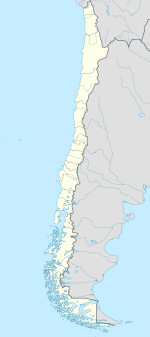Huara is a Chilean town and commune in Tamarugal Province, Tarapacá Region. It is located 45 km (28 mi) or (75 km (47 mi) by road) northeast of Iquique. The village is crossed by the Pan-American Highway and is the crossing point for the road that goes to Oruro in Bolivia. This road also serves as access to the Atacama Giant site and the Volcán Isluga National Park.
Huara | |
|---|---|
| Coordinates: 19°59′S 69°47′W / 19.983°S 69.783°W | |
| Country | |
| Region | |
| Province | Tamarugal |
| Government | |
| • Type | Municipal council |
| Area | |
| • Total | 10,474.6 km2 (4,044.3 sq mi) |
| Population (2012 Census)[1] | |
| • Total | 2,129 |
| • Density | 0.20/km2 (0.53/sq mi) |
| • Urban | 0 |
| • Rural | 2,599 |
| Sex | |
| • Male | 1499 |
| • Female | 1100 |
| Time zone | UTC-4 (CLT[2]) |
| • Summer (DST) | UTC-3 (CLST[3]) |
| Area code | (+56) 5 |
| Website | www |
The commune also comprises the Pisagua and Tarapacá hamlets.
Huara was badly damaged during an earthquake in 2005.
Demographics edit
According to the 2002 census of the National Statistics Institute Huara had 2,599 inhabitants (1,499 men and 1,100 women), making it an entirely rural area. The population grew by 1.8% (627 persons) between the 1992 and 2002 censuses.[1]
Administration edit
As a commune, Huara is a third-level administrative division of Chile administered by a municipal council, headed by an alcalde who is directly elected every four years.
Within the electoral divisions of Chile, Huara is represented in the Chamber of Deputies by Mrs. Marta Isasi (Ind.) and Mr. Hugo Gutiérrez (PC) as part of the 2nd electoral district, which includes the entire Tarapacá Region. The commune is represented in the Senate by José Miguel Insulza (PS, 2018–2026) and José Durana (UDI, 2018–2026) as part of the 1st senatorial constituency (Arica and Parinacota Region and Tarapacá Region).
References edit
- ^ a b c d (in Spanish) National Statistics Institute
- ^ "Chile Time". WorldTimeZones.org. Archived from the original on 11 September 2007. Retrieved 9 September 2010.
- ^ "Chile Summer Time". WorldTimeZones.org. Archived from the original on 11 September 2007. Retrieved 9 September 2010.
External links edit
- Claudio Aguirre Munizaga y Alberto Díaz Araya, El espejismo de los lugares. La construcción del espacio en el desierto tarapaqueño. Huara, siglos XIX-XX, Revista de geografía Norte Grande versión On-line ISSN 0718-3402


